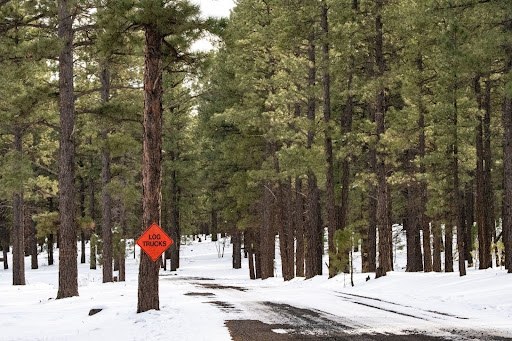
Since the new administration took office, they’ve adopted a “flood-the-zone” approach to policy. That means mass firings of federal employees, including ten percent of the Forest Service’s workforce, and a surge of executive orders (written directives signed by the President) that put our public lands and climate at risk.
With so many policy changes, it’s easy to feel overwhelmed. That’s why we’ve elevated the executive orders that directly affect the public lands and waters we love in the Pacific Northwest. By staying laser-focused on the issues that have the greatest impact on The Mountaineers programs and advocacy agenda, we’ll be well-positioned to make the greatest impact for our community.
A Push to Increase Energy Production on our Public Lands
Over the last three months, the White House released a series of executive orders that will increase resource extraction on our public lands. For starters, the administration declared a national energy emergency. This executive order aims to increase production of “domestic energy resources” on federal lands, despite the fact that the U.S. is already the largest producer of oil and gas. Notably, it excludes renewable energy from its definition of “energy.”
The “Unleashing American Energy” executive order, meanwhile, makes it the policy of the U.S. to “encourage energy exploration and production on federal lands and waters.” This directive temporarily paused distribution of Inflation Reduction Act funding, a bill that our community actively supported and advocated for.
The administration’s efforts to boost resource extraction also include an executive order to expand timber production across millions of acres of our national forests. This would contradict federal management plans of national forests, including the Northwest Forest Plan.
Increased Resource Extraction Could Impact Public Lands
While we support a multi-use approach to forest management, significantly increasing resource extraction on federal lands poses a number of threats to both the health of our lands and waters and to the climate. When natural resources like oil and timber are over-extracted, the land is often permanently altered or damaged. This disrupts ecosystems, wildlife habitat, and water quality. And the process of extraction contributes to the worsening climate crisis by releasing greenhouse gas emissions, which accelerates climate change.
We’re concerned that these actions will threaten the recreation experience that many Americans, including our community, hold dear. Public lands are not just places to extract resources - they are essential for supporting local economies through tourism and recreation, and for providing spaces for people to connect with nature.
Weakening Environmental Safeguards
In addition to increasing energy production on federal lands, the administration has weakened environmental protections for our national forests and parks. The Unleashing American Energy executive order, for instance, doesn’t just boost energy production - it diminishes the power of the National Environmental Policy Act (NEPA). NEPA is a foundational environmental law that requires federal agencies to determine the environmental consequences of proposed projects on public lands and waters before they happen.
NEPA also protects your right to have a voice in shaping these projects. If you joined The Mountaineers in speaking up for access to Mt. Rainier, or to protect the Methow Valley from mining, you’ve participated in a NEPA process. We believe that recreationists should have the ability to comment on agency decisions that might impact the health or quality of our forests and parks.
Other executive orders that impact public lands and weaken environmental safeguards include withdrawing the U.S. from the Paris climate treaty, rescinding climate and environmental executive orders from the previous administration, and renaming Denali in Alaska to Mount McKinley. The Mountaineers will continue to use Indigenous place names, including Denali, in our print and online publications.
Unfortunately, what we’re seeing aligns with what we expected from the administration’s early days in office. The Mountaineers will continue to monitor and track policy changes and defend attacks from the administration and Congress on our public lands and waters. We’ll also serve as a measured and pragmatic voice for the outdoors, and seek opportunities to advance bipartisan recreation priorities, like reauthorizing the Legacy Restoration Fund.
Impacts to Federal Grants and Contracts
In January, the White House paused federal grants and other key funding sources, plunging organizations across the country that rely on federal funding - including many of our partners like the Mountains to Sound Greenway Trust - into uncertainty. Although the memo was rescinded days later, many groups still cannot access promised federal funding.
Federal grants are vital for the conservation and management of public lands. They allow nonprofits to do important work, such as trail maintenance, that improves access to our national forests and parks. That work is especially important today: as our land management agencies face historic budget cuts and sweeping workforce reductions, federal grants enable nonprofits to do projects that our land management agencies might not have the capacity for.
The good news is that a federal judge recently extended their block of the administration’s federal funding freeze. We hope this means that organizations will be able to access their promised federal money. Regardless, The Mountaineers will continue to advocate for the necessary resources to ensure public lands and waters remain well-maintained and accessible to all.
As we navigate policy changes, staffing cuts, and ongoing funding challenges, The Mountaineers remains steadfast in our commitment to protect public lands and ensure a sustainable climate future. To that end, we’re collaborating closely with our partners to monitor executive orders impacting our lands, waters, and climate. We’re also sharing our concerns with lawmakers and their staff and raising awareness with elected officials and the media about the consequences of these decisions. Moving forward, we’ll continue tracking the implementation of these orders and identify opportunities for our community to engage and take action to protect the landscapes we cherish.
Ready to stand up for federally managed public lands? Please write to your lawmakers and ask them to push back against damaging federal workforce cuts.
 The Mountaineers
The Mountaineers